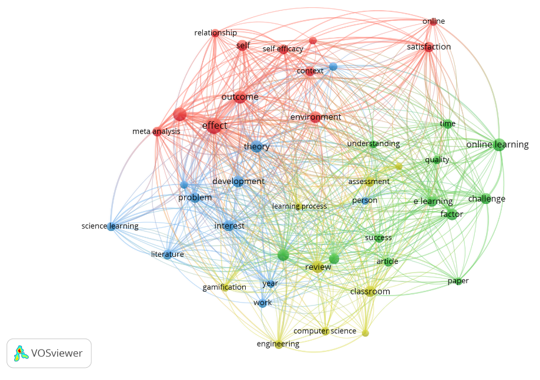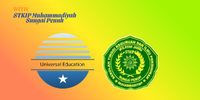Bibliometric: The Role of Science Learning on Student Motivation in Moral Education
https://doi.org/10.63081/uejtl.v2i1.39
Bibliometric, Moral Education, Science Learning, Student Motivation, VOS viewer
Abstract
The purpose of this research was to find out the development and understanding of the role of science learning on students' motivation in moral education using a bibliometric study on the Google Scholar database with the help of VOS viewer. From 2019 to 2023, 953 articles were found from Google Scholar, and 795 were selected, which were related to content, based on data collection results using the keywords "science learning", "student motivation", and "moral education". The results of data searches for the last five years show that from 2019 to 2023, the number of publications has decreased. Three types of visualizations in the data mapping analysis were added: network visualization, overlay visualization, and density visualization, to support the analysis of related articles. It is hoped that the results of this study will help researchers identify developments and understanding of international research related to the keywords proposed.
References
Aldowah, H., Al-Samarraie, H., & Fauzy, W. M. (2019). Educational data mining and learning analytics for 21st century higher education: A review and synthesis. Telematics and Informatics, 37, 13–49. https://doi.org/https://doi.org/10.1016/j.tele.2019.01.007
Anderman, E. M. (2020). Achievement motivation theory: Balancing precision and utility. Contemporary Educational Psychology, 61, 101864. https://doi.org/https://doi.org/10.1016/j.cedpsych.2020.101864
Asif, T., Guangming, O., Haider, M. A., Colomer, J., Kayani, S., & Amin, N. U. (2020). Moral Education for Sustainable Development: Comparison of University Teachers’ Perceptions in China and Pakistan. In Sustainability (Vol. 12, Issue 7). https://doi.org/10.3390/su12073014
Bakri, N., Hamid, A., Ahmad, N., & Alam, R. (2022). The Educational Orientation of Malaysia: The P.I.E.S Element of a Balanced Person in The National Education Philosophy (NEP) (The Perspective of Islam Through the Interpretation of Sayid Qutb). Jurnal Pendidikan Dan Kependidikan), 6(2), 143–156. https://doi.org/10.47766/idarah.v6i.2.963
Bean, J. C., & Melzer, D. (2021). Engaging ideas: The professor’s guide to integrating writing, critical thinking, and active learning in the classroom. John Wiley & Sons.
Begum, A., Liu, J., Qayum, H., & Mamdouh, A. (2022). Environmental and Moral Education for Effective Environmentalism: An Ideological and Philosophical Approach. International Journal of Environmental Research and Public Health, 19(23). https://doi.org/10.3390/ijerph192315549
Bukar, U. A., Sayeed, M. S., Razak, S. F. A., Yogarayan, S., Amodu, O. A., & Mahmood, R. A. R. (2023). A method for analyzing text using VOSviewer. MethodsX, 11(August), 102339. https://doi.org/10.1016/j.mex.2023.102339
Chen, C., & Song, M. (2019). Visualizing a field of research: A methodology of systematic scientometric reviews. PLoS ONE, 14(10). https://doi.org/10.1371/journal.pone.0223994
Chowdhury, M. (2016). Emphasizing Morals, Values, Ethics, and Character Education in Science Education and Science Teaching. Malaysian Online Journal of Educational Sciences, 4(2), 1–16.
Coccia, M., & Rolfo, S. (2008). Strategic change of public research units in their scientific activity. Technovation, 28(8), 485–494. https://doi.org/https://doi.org/10.1016/j.technovation.2008.02.005
Collins, R., Cottom, T. M., & Stevens, M. L. (2019). The Credential Society. Columbia University Press.
Darling-Hammond, L., Lisa, F., Channa, C.-H., Brigid, B., & and Osher, D. (2020). Implications for educational practice of the science of learning and development. Applied Developmental Science, 24(2), 97–140. https://doi.org/10.1080/10888691.2018.1537791
DeBoer, G. (2019). A history of ideas in science education. Teachers college press.
Dewi, P. Y. A., & Primayana, K. H. (2019). Effect of Learning Module with Setting Contextual Teaching and Learning to Increase the Understanding of Concepts. International Journal of Education and Learning, 1(1), 19–26. https://doi.org/10.31763/ijele.v1i1.26
Donthu, N., Kumar, S., Mukherjee, D., Pandey, N., & Lim, W. M. (2021). How to conduct a bibliometric analysis: An overview and guidelines. Journal of Business Research, 133(April), 285–296. https://doi.org/10.1016/j.jbusres.2021.04.070
Fitriyani, Y., Fauzi, I., & Sari, M. Z. (2020). Motivasi Belajar Mahasiswa Pada Pembelajaran Daring Selama Pandemik Covid-19. Profesi Pendidikan Dasar, 7(1), 121–132. https://doi.org/10.23917/ppd.v7i1.10973
Gan, Y., Li, D., Robinson, N., & Liu, J. (2022). Practical guidance on bibliometric analysis and mapping knowledge domains methodology – A summary. European Journal of Integrative Medicine, 56, 102203. https://doi.org/https://doi.org/10.1016/j.eujim.2022.102203
Hadi, N. (2019). Concept of Educational Values for Tauhid Nation Education System Perspective. Indonesian Journal of Islamic Education Studies (IJIES), 2(1), 1–16. https://doi.org/10.33367/ijies.v2i1.652
Haghnazar Koochaksaraei, R., Gadelha Guimarães, F., Hamidzadeh, B., & Hashemkhani Zolfani, S. (2021). Visualization Method for Decision-Making: A Case Study in Bibliometric Analysis. In Mathematics (Vol. 9, Issue 9). https://doi.org/10.3390/math9090940
Hariyadi, A., Darmuki, A., Shofwani, S. A., M Auruma, P. H., & Sasmita, W. R. (2022). School Principal Leadership Strategies in Improving Academic Quality in High Schools. ANP Journal of Social Sciences and Humanities, 3(1), 48–53. https://doi.org/10.53797/anp.jssh.v3i1.7.2022
Harmadi, M. B. R., Adiguna, A. J., Putri, D. C. S., Banuati, N., Pambudi, A. L., & Broto, L. S. W. (2022). Moral Education and Social Attitudes of the Young Generation: Challenges for Indonesia and the International Community. Jurnal Panjar: Pengabdian Bidang Pembelajaran, 4(2), 174–222. https://doi.org/10.15294/panjar.v4i2.55045
Hatami, A. M., Sabour, M. R., Haj Babaei, M. R., & Nematollahi, H. (2021). Global Trends of VOSviewer Research, Emphasizing Environment and Energy Areas: A Bibliometric Analysis During 2000-2020. Environmental Energy and Economic Research, 6(1), 1–11. https://doi.org/10.22097/EEER.2021.301784.1216
Henry, M. A., Shorter, S., Charkoudian, L., Heemstra, J. M., & Corwin, L. A. (2019). FAIL is not a four-letter word: A theoretical framework for exploring undergraduate students’ approaches to academic challenge and responses to failure in STEM learning environments. CBE Life Sciences Education, 18(1). https://doi.org/10.1187/cbe.18-06-0108
Heritage, M. (2010). Formative assessment: Making it happen in the classroom. In Formative Assessment: Making it Happen in the Classroom. https://doi.org/10.4135/9781452219493
Hidayati, N. A., Waluyo, H. J., Winarni, R., & Suyitno. (2020). Exploring the implementation of local wisdom-based character education among indonesian higher education students. International Journal of Instruction, 13(2), 179–198. https://doi.org/10.29333/iji.2020.13213a
Holton, I., Elwood, F., & Robinson, P. A. (2020). The adult learner: The definitive classic in adult education and human resource development. Routledge.
Husaeni, D. F. Al, Nandiyanto, A. B. D., & Maryanti, R. (2023). Bibliometric Analysis of Educational Research in 2017 to 2021 using VOSviewer: Google Scholar indexed Research. Indonesian Journal of Teaching in Science, 3(1), 1-8. https://doi.org/10.17509/ijotis.v3i1.43182
Jeynes, W. H. (2019). A Meta-Analysis on the Relationship Between Character Education and Student Achievement and Behavioral Outcomes. Education and Urban Society, 51(1), 33–71. https://doi.org/10.1177/0013124517747681
Jumaevich, K. K., Abdullajonovna, & Tashkent, A. G. (2021). Technology of Cooperation in the Formation of Spiritual and Moral Education of Young People in Society and Its Qualimetry. Annals of R.S.C.B., 25(3), 7062–7068.
Khan, M. A., Pattnaik, D., Ashraf, R., Ali, I., Kumar, S., & Donthu, N. (2021). Value of special issues in the journal of business research: A bibliometric analysis. Journal of Business Research, 125, 295–313. https://doi.org/https://doi.org/10.1016/j.jbusres.2020.12.015
Kipper, L. M., Iepsen, S., Dal Forno, A. J., Frozza, R., Furstenau, L., Agnes, J., & Cossul, D. (2021). Scientific mapping to identify competencies required by industry 4.0. Technology in Society, 64, 101454. https://doi.org/10.1016/j.techsoc.2020.101454
Knowles, S. M., Holton Iii, E. F., & Swanson, R. A. (2005). The adult learner (6th ed.). Elsevier.
Latief, S., Sari, Y. A., Yusuf, M., Armila, A., & Hidayat, R. E. (2021). The Development of Islamic Education and Strengthening of National Education System of Indonesia. International Journal on Advanced Science, Education, and Religion, 4(2), 86–99. https://doi.org/10.33648/ijoaser.v4i2.105
Lavy, S. (2020). A Review of Character Strengths Interventions in Twenty-First-Century Schools: their Importance and How they can be Fostered. Applied Research in Quality of Life, 15(2), 573–596. https://doi.org/10.1007/s11482-018-9700-6
Levine-Clark, M., & and Gil, E. L. (2008). A Comparative Citation Analysis of Web of Science, Scopus, and Google Scholar. Journal of Business & Finance Librarianship, 14(1), 32–46. https://doi.org/10.1080/08963560802176348
Makransky, G., Borre‐Gude, S., & Mayer, R. (2019). Motivational and Cognitive Benefits of Training in Immersive Virtual Reality Based on Multiple Assessments. Journal of Computer Assisted Learning. https://doi.org/10.1111/jcal.12375
Malone, T. W., & Lepper, M. R. (2021). Making learning fun: A taxonomy of intrinsic motivations for learning. In Aptitude, Learning, and Instruction. Taylor & Francis. http://www.sciencedirect.com/science/article/pii/S0160738315000444
Margot, K. C., & Kettler, T. (2019). Teachers’ perception of STEM integration and education: a systematic literature review. International Journal of STEM Education, 6(1). https://doi.org/10.1186/s40594-018-0151-2
Muhuri, P. K., Shukla, A. K., & Abraham, A. (2019). Industry 4.0: A bibliometric analysis and detailed overview. Engineering Applications of Artificial Intelligence, 78, 218–235. https://doi.org/10.1016/j.engappai.2018.11.007
Muis, A., hosaini, H., Eriyanto, E., & Readi, A. (2019). Role of the Islamic Education teacher in the Moral Improvement of Learners. Jurnal At-Tarbiyat: Jurnal Pendidikan Islam, 5, 411–422. https://doi.org/10.37758/jat.v5i3.487
Ruiz, A. P., Flynn, M., Large, J., Middlehurst, M., & Bagnall, A. (2021). The great multivariate time series classification bake off: a review and experimental evaluation of recent algorithmic advances. Data Mining and Knowledge Discovery, 35(2), 401–449. https://doi.org/10.1007/s10618-020-00727-3
Saari, Eveliina, & Miettinen, Reijo. (2001). Dynamics of Change in Research Work: Constructing a New Research Area in a Research Group. Science, Technology, & Human Values, 26(3), 300–321. https://doi.org/10.1177/016224390102600303
Sahin, D., & Yilmaz, R. M. (2020). The effect of Augmented Reality Technology on middle school students’ achievements and attitudes towards science education. Computers & Education, 144, 103710. https://doi.org/10.1016/j.compedu.2019.103710
Sani, A., Rochintaniawati, D., & Winarno, N. (2019). Enhancing students’ motivation through brain-based learning. Journal of Physics: Conference Series, 1157(2). https://doi.org/10.1088/1742-6596/1157/2/022059
Saravanakumar, A. R. (2020). Life skill education for creative and productive citizens. Journal of Critical Reviews, 7(9), 554–558. https://doi.org/10.31838/jcr.07.09.110
Schunk, D. H., & DiBenedetto, M. K. (2020). Motivation and social cognitive theory. Contemporary Educational Psychology, 60, 101832. https://doi.org/10.1016/j.cedpsych.2019.101832
Seow, P.-S., Pan, G., & Koh, G. (2019). Examining an experiential learning approach to prepare students for the volatile, uncertain, complex and ambiguous (VUCA) work environment. The International Journal of Management Education, 17(1), 62–76. https://doi.org/10.1016/j.ijme.2018.12.001
Snarey, J., & Green, A. (2011). Kohlberg, Lawrence BT - Encyclopedia of Child Behavior and Development (S. Goldstein & J. A. Naglieri (eds.); pp. 855–859). Springer US. https://doi.org/10.1007/978-0-387-79061-9_1594
Struyf, A., Haydée, D. L., Jelle, B. P., & and Van Petegem, P. (2019). Students’ engagement in different STEM learning environments: integrated STEM education as promising practice? International Journal of Science Education, 41(10), 1387–1407. https://doi.org/10.1080/09500693.2019.1607983
Utamirohmahsari. (2024). Character education building a generation with integrity and ethics. IJM (International Journal Multidisciplinary : Economics, Management, Law and Education), 1(1).
van Kraalingen, I. (2023). A systematized review of the use of mobile technology in outdoor learning. Journal of Adventure Education and Outdoor Learning, 23(3), 203–221. https://doi.org/10.1080/14729679.2021.1984963
Walia, N. (2022). Promoting Ethics And Morality In Education For Equality, Diversity And Inclusivity. Journal of Multidisciplinary Cases, 21, 1–9. https://doi.org/10.55529/jmc.21.1.9
Walters, W. H. (2007). Google Scholar coverage of a multidisciplinary field. Information Processing & Management, 43(4), 1121–1132. https://doi.org/10.1016/j.ipm.2006.08.006
Wamsler, C. (2020). Education for sustainability: Fostering a more conscious society and transformation towards sustainability. In International Journal of Sustainability in Higher Education (Vol. 21). https://doi.org/10.1108/IJSHE-04-2019-0152
Wong, S. L., Nyakuma, B. B., Wong, K. Y., Lee, C. T., Lee, T. H., & Lee, C. H. (2020). Microplastics and nanoplastics in global food webs: A bibliometric analysis (2009–2019). Marine Pollution Bulletin, 158, 111432. https://doi.org/10.1016/j.marpolbul.2020.111432
Yamin, M. (2019). Information technologies of 21st century and their impact on the society. International Journal of Information Technology, 11(4), 759–766. https://doi.org/10.1007/s41870-019-00355-1
Zidny, R., Sjöström, J., & Eilks, I. (2020). A Multi-Perspective Reflection on How Indigenous Knowledge and Related Ideas Can Improve Science Education for Sustainability. Science & Education, 29(1), 145–185. https://doi.org/10.1007/s11191-019-00100-x

Downloads
Published
Versions
- 2025-04-19 (2)
- 2025-04-19 (1)
How to Cite
Issue
Section
License
Copyright (c) 2025 Mia Widyaningsih, Babang Robandi (Author); Ahmad Mudzakir

This work is licensed under a Creative Commons Attribution-NonCommercial 4.0 International License.







